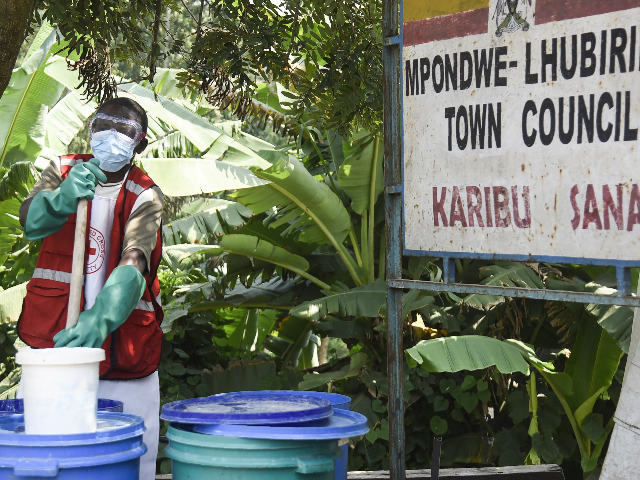Ugandan newspapers reported Thursday that three people quarantined under suspicions of carrying the Ebola virus escaped isolation, stoking fears that the virus will rapidly spread two days after Uganda confirmed its first case.
Neighboring Democratic Republic of Congo (DRC) is battling an ongoing outbreak already deemed the second-worst in history after the one that hit west Africa in 2014. The World Health Organization (WHO) has documented over 2,000 cases in DRC since the outbreak began in August 2018.
The outbreak has not spread as rapidly as the 2014 one that ravaged Sierra Leone, Liberia, and Guinea in large part because of the existence of an experimental vaccine against the virus that has proven successful, developed in the aftermath of the last outbreak. Yet it faces challenges unique to the Congolese geographical and political situation. North Kivu, the region most heavily affected, is a complex urban war zone, unlike most of the areas affected in 2014. It is densely populated and under the threat of roving guerrillas of various factions.
Like the west African regions affected by Ebola, however, the local populations in DRC and Uganda are highly suspicious of Western medical aid and many refused to believe that Ebola is a real disease. Rumors spread, often at the hands of traditional herbalists, that the Western doctors are the ones bringing Ebola virus to their communities as a form of population control. These fears have triggered widespread attacks on Ebola clinics and hospitals in DR Congo and inspired patients to flee treatment and potentially expose others.
The latter appears to be the case in Uganda. The nation’s Monitor newspaper reported Thursday that three people – identified as Congolese nationals Saddi Muhima, 46, his son Issa Muhima, 19, and Milton Nsenga – fled the Kihihi Health Centre IV in western Uganda, near the DRC border. Local authorities say that they did not have time to confirm that the three had Ebola. Authorities isolated them after they crossed the border into Uganda and presented fevers, but the reports do not indicate that they exhibited the more advanced hemorrhaging symptoms that characterize Ebola.
“The Kanungu Health Inspector, Kato Besisira, says the trio escaped as the health workers were preparing to draw blood samples from them and rush them to Uganda Virus Research Institute (UVRI) Entebbe for examination,” the Monitor reported.
Authorities believe that the three fled home to DRC, but could have interacted with others in Uganda before reaching the border, potentially spreading the disease further.
Medical officials in DRC have faced similar challenges in keeping patients quarantined and convincing them to accept medical care. Militias falsely believing Ebola treatment centers to be fatal to locals have attacked several facilities in North Kivu. In May, one such attack resulted in the killing of senior doctor working to treat Ebola cases, prompting health workers to demand the government offer them better protection in exchange for their services.
Their flight follows the second recorded Ebola death in Uganda, announced on Wednesday. The victim was an elderly woman, the grandmother of the first recorded Ebola fatality in this outbreak, a five-year-old boy, who traveled into DRC with his family and is believed to have contracted the virus from a Congolese relative. The WHO’s most recent update on Ebola in Uganda says relatives told officials the family traveled to DRC for the funeral of the boy’s grandfather, who died of Ebola. The boy’s younger brother was the second recorded Ebola death in Uganda.
Uganda’s government claims to have imposed strict regulations at border crossings with DRC to prevent the virus from spreading on their side, leaving many wondering how authorities did not identify the family as potential carriers when they came back into Uganda.
“It was not immediately clear how the family members were able to cross the border, where millions of travelers have been screened for Ebola since the outbreak began. WHO [World Health Organization] has advised against travel restrictions,” the Associated Press (AP) reported this week.
Dr. Richard Obeti, a local Ugandan public health official, told the Monitor that medical staff had exhibited “laxity” in taking precautions against Ebola but “are now sensitising all health workers about the outbreak of the disease.” The WHO has also escalated efforts to prevent the rapid spread of the virus in the country, reportedly expanding the number of response teams sent to the border.
The spread of Ebola into Uganda comes as the WHO recently reported good news: the rate of new cases in DRC has diminished.
“In the Democratic Republic of the Congo the EVD [Ebola] outbreak continues to show a decrease in the number of new cases, with 54 new confirmed cases reported in the past week, compared to 88 cases reported per week during the last two weeks,” the WHO’s most recent report reads. “While a relatively lower incidence of new cases continues to be seen some hotspots such as Katwa, Beni and Kalunguta health zones, elsewhere the situation appears more tenuous. Active transmission is ongoing in communities within 11 health zones in North Kivu and Ituri provinces.”
As of June 11, the WHO has documented 2,084 cases of Ebola in the current outbreak, nearly 70 percent of which have been lethal.

COMMENTS
Please let us know if you're having issues with commenting.